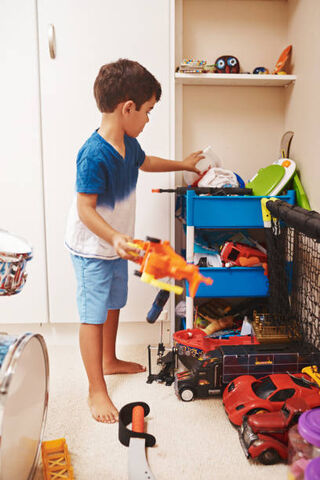
Self-Control
7 Tips to Develop Children's Self-Discipline
Disciplining young children calls for consistency and kindness.
Posted August 5, 2020 Reviewed by Devon Frye

Disciplining our sons to be tidy was futile. As they were growing up, I tried the Family-Teamwork, the Because-I-Said-So, and the If-It-Isn’t-In-The-Hamper-I-Won’t-Wash-It techniques, without success.
Finally, when both boys were away at college, our home became pleasantly clutter-free. Then our eldest graduated and came home to live and work in Washington. We welcomed his return. The house, however, resumed its former disorderliness.
One day, relaxing together in the littered family room, I said, “I hope you know how happy we are to have you home, even if it’s probably not much fun for you.”
He said, “I do know. Actually, I’m glad to be home. It’s fine.”
I added, “Do you know how much I appreciate your efforts to pick up after yourself?”
Immediately, he scooped up his sneakers, smartphone, and mail and laughed, “Was that a trick question?”
No, that was not a trick question. That question was, to my surprise, the Sincerely-Sympathetic discipline technique that finally worked!
Discipline is teaching someone—specifically, a child—to behave in a civilized manner. The goal of discipline is self-discipline, so that the child internalizes moral and behavioral codes taught at your knee and matures as a responsible, considerate, self-regulated adult.
As you seek a technique that works for your family, and especially your young children, here are some gentle reminders:
Discipline now, or punish later. Ideally, discipline precedes and prevents socially unacceptable behavior, whereas punishment follows it. Each has its place, but remember that punishment is negative and may encourage a child to be devious so he won’t get caught again, while discipline is a positive measure that sponsors a child’s self-control.
Be grown-up. Children need authentic, flexible, caring grown-ups who love them unconditionally—especially when they are annoying you greatly. Suppose your child frantically scratches an itchy rash until she bleeds. It doesn’t help to say, “Stop scratching. Do you want to be scarred for life?” Instead, say, “I know you itch all over, but scratching makes it worse. Let’s put lotion on your skin to soothe it.” Find solutions and model rational behavior so that your child learns coping and problem-solving skills.
Be consistent. Suppose your child clamors for attention the moment you arrive home, before you even set down your bag or jacket. If you respond calmly today but irritably tomorrow, your child will get a fuzzy message about your expectations. Try a consistent approach, such as, “Please give me a chance to put my things down and change my shoes. Then I’ll be ready to hear all about your day.” Then, do it: Put your things down, change your shoes, and give your child your undivided attention. Consistency pays.
Give the child some control. Say your young child would like to watch television or play video games constantly, and you are concerned that she is not getting sufficient sensory-motor activity, is not playing outdoors, and is not interacting with the family. What you think she needs may not impress her, so strike a deal: She may watch TV or play a video game for one hour after supper, and then choose a bedtime story, a board game, or another activity that she likes. Remember the Law of Equivalency, one definition of which says that when you take something away, you must replace it with something of equal value. Remember, too, that parental approval and involvement are the young child’s most meaningful reinforcements.
Build on what the child does right. Suppose he does half his homework and then heads outside with his basketball. Rather than saying, “Smart students like your brother complete their work before they play,” try, “It’s great that you’ve made a dent in your homework. Shooting a few baskets will refresh you so you can finish the job.” Praise and understanding always outshine blame, shame, and disrespect.
Be future-oriented. Maybe you are fastidious, and your son loves mud. Maybe you want to read the newspaper, and he wants to talk about Power Rangers. Maybe you like soft classical music, and he likes loud kids’ rap. Before you discipline him, consider your long-range goals. Do you want him to learn about his environment through hands-on exploration, improve his communication skills, and develop a personal aesthetic sense—or do you want him just to obey?
Discipline to provide a sense of belonging. “In our family, we don’t do that,” is effective for offenses from open-mouthed chewing to hurling snowballs at cars. Avoid commenting, “Don’t ever let me catch you doing that again,” because a child may take that as a challenge to keep doing it when she’s sure you won’t watch. Discipline should be inclusive, not exclusive, so that the child feels connected to his family and to his community at large.
If one technique doesn’t succeed, try, try another—and remember to keep your sense of humor!



